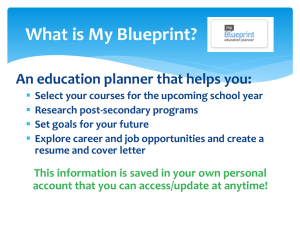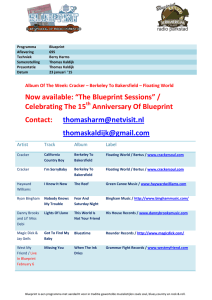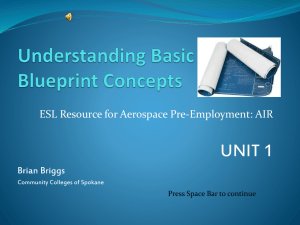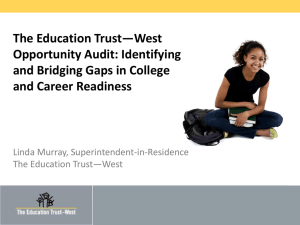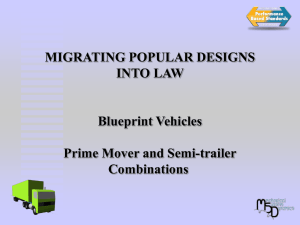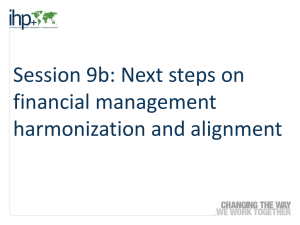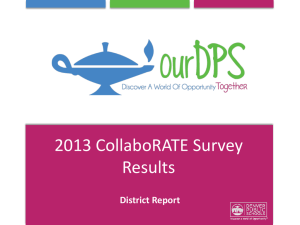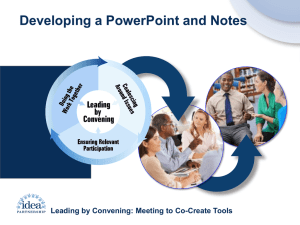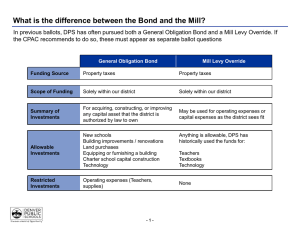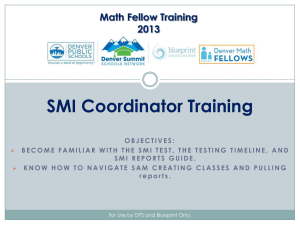DTM Curriculum Training 091913
advertisement
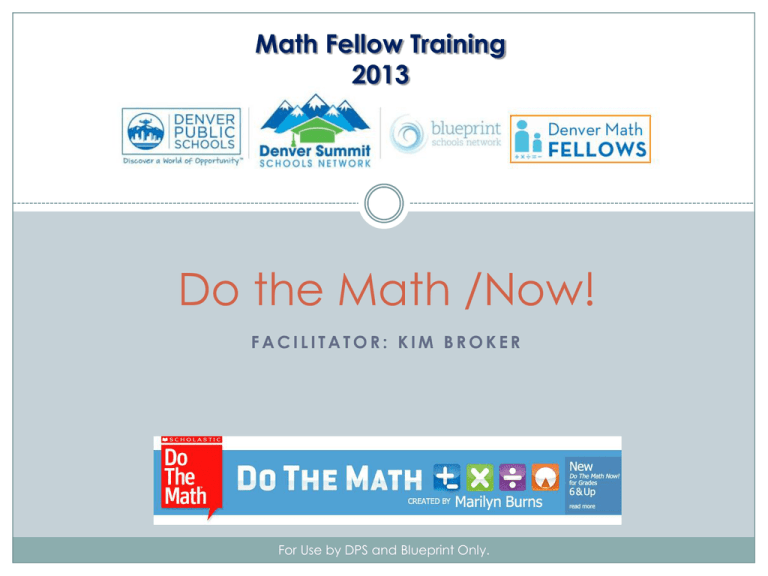
Math Fellow Training 2013 Do the Math /Now! FACILITATOR: KIM BROKER For Use by DPS and Blueprint Only. Do Now Write on a post-it responding to the following questions: If you could wake up anywhere tomorrow where would it be? What was the first CD you purchased? For Use by DPS and Blueprint Only. Professional Development Outcomes Understand the scope and sequence of Do The Math Teacher Guides and Lessons Become familiar with the materials provided with Do The Math Understand how to use the Beginning and Endof Module Assessments to inform instruction and guide lessons Experience a “mock” tutorial session as the teacher and/or student. For Use by DPS and Blueprint Only. Tutorial Structure: Foundational PHASE Beginning Middle Component I. The Do Now (5 minutes) As much about the culture of the tutorial as the content, the Do Now functions as a bridge to other components of the tutorial. The Do Now will cover fluency, basic skills, and/or number sense problem solving. II. Foundational Skills (30 minutes) Provide students with support around foundational math skills and vocabulary to fill in the gaps in learning. During this time you will review and drill basic skills, individualized to the student needs. To provide students with high dosages of support and clarification as they begin to practice and engage with new material that directly relates to the Common Core State Standards at that grade level. III. Grade Level Material (20 minutes) End Purpose IV. Ticket To Leave/Exit Ticket (5 minutes) To check independent practice, revisit the tutorial objectives, and/or summarize key ideas. For Use by DPS and Blueprint Only. The 13 Do The Math Modules For Use by DPS and Blueprint Only. The 13 Do The Math Modules For Use by DPS and Blueprint Only. Getting to know the materials Teacher Bookcase Teacher Guide Annotated Workspace Student Workspace CD-Rom Interactive Software Teacher Materials Student Materials Game Bags For Use by DPS and Blueprint Only. Getting to know the materials Teacher Bookcase Teacher Guide Manipulative Materials TeacherSpace Student WorkSpace™ Read Alouds For Use by DPS and Blueprint Only. ProgressSpace Online Assessments and Reporting PD Book Interactive Whiteboard Tools Letter from Marilyn Read before each module Provides conceptual understandings about the math Gives visual examples For Use by DPS and Blueprint Only. Weekly Planner Shows a week at a glance with 5 lessons and a Show What You Know, end of week assessment. Lesson Summary Objectives Materials Differentiation For Use by DPS and Blueprint Only. Beginning and End-of Module Assessments Beginning Module Assessment- needs to be given at least 2-3 days prior to teaching. Students need to score above a 25% in order to show they have enough background knowledge to access the information in the module. If they score above an 80% then they do not need this module. After teaching the first ten lessons with fidelity, then use the Beginning Module Assessment to plan for instruction. End-of Module Assessment- given at the end of the module. Students need to score 80% or above in order to move on to the next module. If they score less than 80%, then reteach concepts missed. For Use by DPS and Blueprint Only. Gradual Release Model Phase 1: The teacher models and records the mathematical representation on the board. Phase 2: The teacher models again, now eliciting responses from students, and again records on the board. Phase 3: Students work in pairs to do the mathematics and then the teacher, once again, records on the board. Phase 4: Students work independently, monitored and supported by the teacher. I DO, WE DO, YOU DO For Use by DPS and Blueprint Only. Video Lesson Do you see the gradual release model in action? How is this structure supportive of student learning? What evidence do you see of strong implementation of the curriculum? Did you see the Fellow reading from the script, why is this important? What does the student engagement look like? How can you tell that students are engaged in the learning? What do you see the Fellow doing? What do you see the students doing? Are there noticings or wonderings that you have? For Use by DPS and Blueprint Only. Planning for a Lesson Read through one lesson from your module. Plan for lesson: Objective Exit Ticket Vocabulary Misconceptions Strategies Questions Work Space problems identified For Use by DPS and Blueprint Only. Mock Teach A Lesson Working with a partner, read through two separate lessons and then mock teach them to each other. Experience what it is like to teach a lesson using Do The Math Experience what it is like to be a student Provide each other feedback For Use by DPS and Blueprint Only. Exit Ticket o Answer the following questions on the Exit Ticket: o o o o How many lessons are in 1 module? How many lessons do you need to teach in a module with fidelity before reassessing student understanding, why? How do you plan to use the Beginning Module Assessment when plan for instruction? Explain why there is a strong emphasis on the importance of lesson planning? What questions do you still have around implementation of curriculum? For Use by DPS and Blueprint Only.

